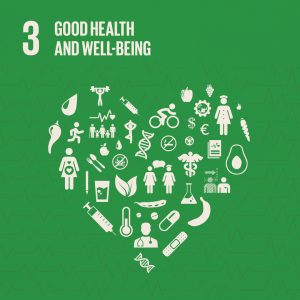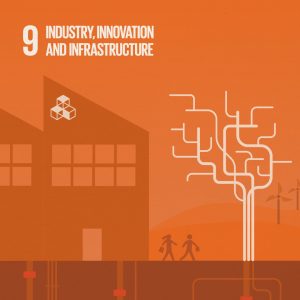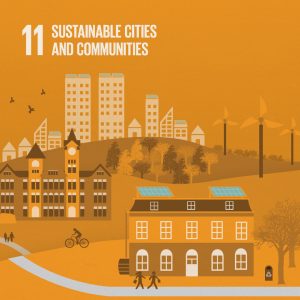“Young adults want to ride more and drive less, and with defined borders and high-density environments, university campuses are ideal settings to cultivate a culture of biking.” ~The League of American Bicyclists
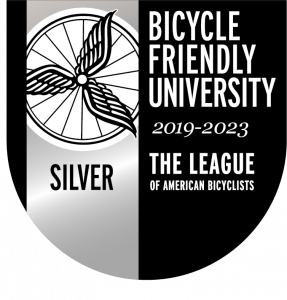
Bicycle Friendly University Silver Designation
The League of American Bicyclists has certified the Auburn University campus as a Bicycle Friendly University, at the Silver level of bicycle friendliness.
This is an accomplishment for Auburn University and the surrounding Auburn-Opelika community. Do an Internet search on “the future of cycling,” and you will find numerous studies declaring that cycling will play an increasingly important role in urban transportation systems.
The benefits of cycling are well documented. The Amsterdam-based global non-governmental organization BYCS lists “The 5 Transformative Impacts of Urban Cycling.”
- Health. People who cycle regularly significantly reduce risks of serious diseases like heart disease and cancer. The mental health benefits are significant, too, reducing anxiety and stress and supporting a sense of wellbeing.
- Mobility. With proper infrastructure, it is easy to get from point A to point B, with enough time and flexibility to make a few stops along the way. Bikes are simple and affordable, an accessible form of transportation that almost anyone can use to get around.
- Community. Moving along at a humane speed and in close contact with one’s surroundings, we notice details in neighborhoods and shops and can readily interact with others.
- Environment. Cycling is a great way to reduce disease-causing air pollution and our individual and collective carbon footprint. Cycling is a zero-carbon form of transportation.
- Economy. According to one study, non-motorists spend 40% more each month in neighborhood shops than those traveling in autos.
What does it take to become a bicycle-friendly campus or community? The League identifies five essential elements of a bicycle-friendly community that they have labeled the Five E Framework.
- Equity & Accessibility: A Bicycle Friendly America for Everyone. The goal is to make sure that everyone has the opportunity to reach their full potential and prosper, including improving and increasing access to mobility, especially for those with disabilities. The League emphasizes that Equity & Accessibility is the lens through which the other elements of the Five E Framework are assessed.
- Engineering: Creating Safe and Convenient Places to Ride and Park. Having the infrastructure in place to support and encourage cycling is the key factor people consider before deciding if they are willing to ride. Elements include “well-connected bicycling networks, consisting of quiet neighborhood streets, conventional and protected bike lanes, shared use trails, and policies to ensure connectivity and maintenance of these facilities. Secure, convenient, and readily available bike parking is also a key component.” Beyond that, shower and locker facilities make cycling more available to a wider range of people in the workplace.
- Education: Giving People of All Ages and Abilities the Skills and Confidence to Ride. Learning how to ride a bike is one thing. Learning how to ride safely, responsibly, and with skill is something else. Communities that offer an array of educational opportunities that serve those looking to improve their cycling skills go a long way toward increasing bicycle ridership.
- Encouragement: Creating a Strong Bike Culture That Welcomes and Celebrates Cycling. A strong bike culture includes things like community events that celebrate cycling and cyclists and making bike routes and maps available. Innovations like bike sharing systems and internal fleets are convenient and cost-effective and make riding easy and convenient. These systems are popping up everywhere – including on Auburn’s campus this fall.
- Evaluation & Planning: Planning for Bicycling as a Safe and Viable Transportation Option. Bicycle-friendly campuses and communities don’t just happen. They result from incorporating cycling into a campus or community’s master plan, including a bicycle-specific master plan. They require sufficient funding and institutional support in the form of a cycling program coordinator and a cycling committee to help leaders make informed decisions.
In the last fifteen years, Auburn University has significantly improved campus walkability and become more bike friendly, with more improvements on the way. The university has an active bicycle committee that is responsible for Auburn receiving our Bicycle Friendly Silver designation. UAB, at Bronze, is the only other campus in the state to receive bike-friendly recognition.
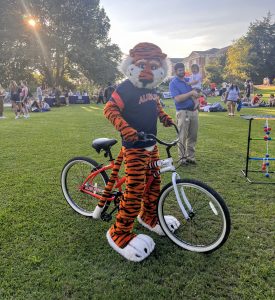
Aubie riding a bicycle at the 2022 Sustainability Picnic. Photo credit: Kaylee Dimock.
The City of Auburn Bicycle Committee has existed since 2000 and has created programs that have led to the City of Auburn being designated a Bronze level Bike Friendly Community, one of only two in the state (the other being Gulf Shores). Bronze campuses and communities “may not necessarily feel very welcoming….However, important steps are being taken in all five Es, but particularly in one or two Es.”
With the surge in bike sharing programs and electric bikes, community interest, use, and demand will grow rapidly. We need to make sure that the elements of the Five E Framework drive our efforts to enhance the bike friendliness of our community.
Recognition as a bike-friendly campus and community is only the start. It is a snapshot of where we as a campus and Auburn as a city are on the journey to a whole-system, bicycle-friendly achievement. Much remains to be done, and it is important that we involve ourselves to ensure that progress continues (and have fun in the process). More specifically, here is what a Bicycle Friendly Silver designation means: “Silver colleges and universities definitely feel welcoming to bikes, but there is still usually work to be done in 2 or 3 of the Es to undergird the bicycling culture and opportunities.”
One way we can each contribute to that effort right now is to register and ride during Cycle September. The goal is to get more people riding bikes than ever before, which creates a greater demand for bike friendliness.
To learn more about cycling at Auburn, check out the Biking at Auburn page on the Office of Sustainability website. It is chock full of information and resources to build your cycling knowledge and find ways to ride.
Learn about the SDGs & AU and our contributions related to this post.

